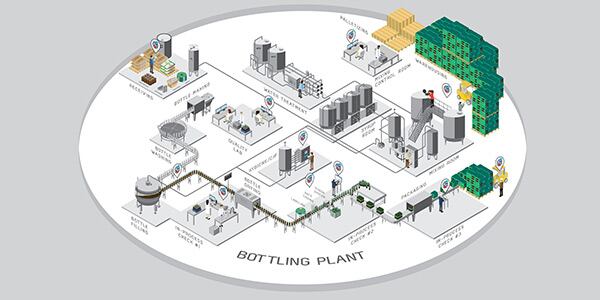Beverage bottlers, like manufacturers everywhere, have worked tirelessly to deal with the disruption of the COVID-19 pandemic.
From enabling some staff to work remotely to adjusting shifts to dealing with a reduced onsite workforce and rapidly changing demand for products, bottlers are testing the limits of their operational agility and flexibility.
But dealing with disruption is what bottling companies are good at. Bottlers are masters of adaptation, having honed their ability to respond to market, supply, economic, and even political change over decades. The current crisis is an extreme example and at a scale most haven’t dealt with, so it exposes where those agility skills are essential.
It also shows where improvement is needed—quickly.
Everything on the line: Quality data is operational data
Bottling quality professionals know the critical value of quality data to ensure that processes move smoothly, that products are consistent and of high quality, and that production yield is optimal. Quality data is essential to ensuring not just product safety and compliance, but for controlling net contents to reduce overfill, making product changeover and hygiene operations more efficient, and intervening when issues arise to prevent those issues from affecting the products that customers receive.
A comprehensive quality management solution enables real-time monitoring and statistical analysis across all operations.

For most plants, the value of that data stops there. Most quality activities are localized at the plant level—sometimes even the line level—to enable operators and quality engineers to quickly spot and fix issues. But once an issue is fixed, the data is forgotten.
This is problematic because most bottling operations today have many plants—at locations all around the globe. When data is stored and used only at one site, it becomes nearly impossible to share what you learn from those fixes to standardize and optimize operations across the enterprise.
Extending the value of quality data
What bottlers need is the ability to see quality data across plants, unify communications, and coordinate operations from a central, single point of reference.
This problem has become even more serious during the current crisis as organizations realize they absolutely must be able to access operational data from remote locations outside the plant. And they need a total view into what’s happening—not just inside individual plants, but across all locations.
Getting that critical, real-time visibility requires a shift in the way you collect and use quality data. Instead of keeping data siloed at all your plants, you can benefit from collecting it all in one place—a centralized database—giving everyone a single view into what’s happening and empowering them to do something meaningful with that information.
Here’s what is exciting about this idea: the technology to do it exists now, and bottlers already have the systems and data they need to make it work.
Moving to the cloud
Cloud-based software is ubiquitous in our lives today. Cloud apps let us manage our bank accounts, order groceries, and keep up with our fitness routines on virtually any device. In quality management, centralizing and standardizing data in the cloud offers myriad benefits that bottlers may not have known were available to them. Modern, cloud-based quality software does more than just store data and help quality managers correct variations. It enables a vast range of capabilities for analyzing data and using the resulting information.
Some bottlers have been slow to adopt a cloud software model for quality management—often for good reasons, but sometimes simply because what they’ve always done is working at a basic level. However, the current pandemic makes it clear that the old way of managing quality doesn’t work now—and likely won’t be advantageous in the future.
Re-imagine quality
The key to creating agility and competitive advantage—now and in the future—is in the quality data you already have. Getting the value out of it requires re-imagining how you manage quality.
Modern Quality Intelligence software provides bottlers with all the advantages of cloud-based software and centralized data, including:
- Quick and cost-effective rollout
- Flexible, real-time data collection
- Anywhere, anytime access to that data—from any Internet-connected device
- Sophisticated tools for using quality data across every level of operations
Having all quality data available in real time enables bottlers to standardize and optimize operations at every level of the organization:
- On the plant floor: Operators and quality professionals can quickly identify and prevent quality issues, ensuring consistency and compliance.
- At the site level: Quality and plant managers can use embedded Statistical Process Control (SPC) methodologies to improve operator efficiency, reduce waste and overfill, and optimize productivity and yield.
- At the corporate level: Having a single source from which to roll up and analyze data, executives can ensure corporate quality standards are being followed at all plants, prioritize high-value process improvements, and develop best practices to improve product quality across the organization.
How can we get there? Make the shift with a proof of concept
For most organizations, the idea of transforming their quality management system sounds good—but also sounds like a big undertaking. Organizations might be daunted by the idea of replacing systems and enabling adoption of the new solution.
Fortunately, cloud-based software is designed for:
- Quick rollout
- Ease of use
- Flexible scalability
- Integration with existing equipment and systems
For most bottlers, it’s possible to get a focused proof of concept up and running quickly on a single line. Once that single program is in place, the results you see will enable you to evaluate the value of the solution very quickly.
Now is the perfect time
Bottling organizations face ongoing challenges beyond the current pandemic crisis. Competing in the global marketplace requires agility and adaptability that can only be achieved with the strategic application of quality data.
Fortunately, bottlers collect lots of data. Once you can leverage that data—to make better faster decisions—you will gain significant competitive advantage that can transform the future of your company.
Cloud software solutions are proven, secure, and surprisingly affordable—and are designed for quick rollout. For manufacturers facing a long period of crisis—and potentially a longer recovery—now may be the perfect time to embrace that transformation.


